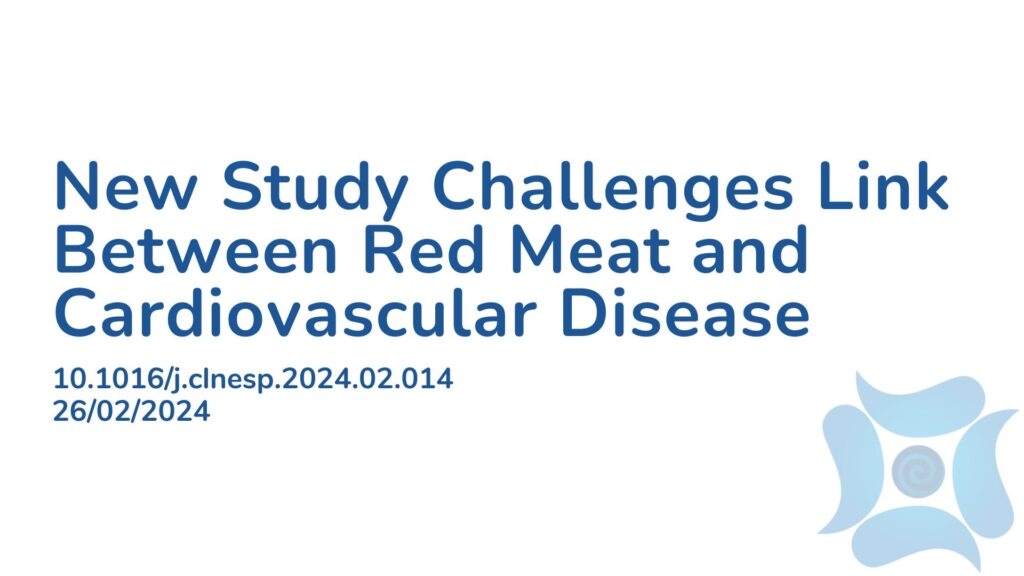Summary:
Cardiovascular disease (CVD) is a major global health concern, responsible for a significant proportion of deaths and poor quality of life for many. There is need for thorough research to identify modifiable risk factors, as currently the intake of red and processed meats has taken most of the blame. While various diets influence cardiovascular health differently, uncertainties remain about the direct effects of red and processed meat consumption on CVD outcomes. Previous studies suggest potential mechanisms linking these meats to CVD development, but findings have been mixed. To address these uncertainties, this study looked at existing data on red and processed meat consumption as well as CVD risk from the UK Biobank. Using statistical methodologies to re-assess the pre-existing data, researchers found no causal associations between red/processed meat intake and four CVD outcomes. Further analysis then confirmed the robustness of these findings. In conclusion, this study suggests no significant causal links between red/processed meat consumption and CVD risk, though further research is needed for validation.
Abstract:
Background & aims: Previous observational studies have yielded inconsistent findings regarding associations between red/processed meat intake and the risk of cardiovascular disease (CVD). Some studies have suggested positive relationships, while others have demonstrated no significant associations. However, causal effects remain uncertain. This 2023 Mendelianrandomization (MR) study investigated the causal relationship between red and processed meat (porkmeat, mutton meat, beef meat)intake and CVD risk by analyzing summary data from the UK Biobank (exposure), CARDIoGRAMplusC4D (coronary artery disease [CAD]), MEGASTROKE (stroke), Nielsen et al. (atrial fibrillation [AF]), HERMES (heart failure [HF]), and FinnGen (cardiovascular outcomes) public databases.
Methods: Genome-wide association studies (GWAS) of red meat (pork, beef, and mutton) and processed meat were sourced from the United Kingdom (UK) Biobank. GWAS data on CVD for this study were obtained from the Gene and FinnGen consortia. The primary method employed for the two-sample MR analysis was inverse variance weighting (IVW). Sensitivity analysis was performed to assess the reliability and consistency of the results.
Results: Genetically predicted red and processed meat consumption did not demonstrate a causal association with any CVD outcomes when employing the IVW method. For processed meat intake, the odds ratios (ORs) (95% confidence intervals CIs) in large consortia were as follows: 0.88 (0.56–1.39) for CAD, 0.91 (0.65–1.27) for AF, 0.84 (0.58–1.21) for HF, and 1.00 (0.75–1.05) for stroke. In FinnGen, the ORs were as follows: 1.15 (0.83–1.59) for CAD, 1.25 (0.75–2.07) for AF, 1.09 (0.73–1.64) for HF, and 1.27 (0.85–1.91) for stroke. For beef intake, the ORs (95% CIs) in large consortia were as follows: 0.70 (0.28–1.73) for CAD, 0.85 (0.49–1.49) for AF, 0.80 (0.35–1.83) for HF, and 1.29 (0.85–1.95) for stroke. In FinnGen, the ORs were as follows: 2.01 (0.75–5.39) for CAD, 1.83 (0.60–5.56) for AF, 0.80 (0.30–2.13) for HF, and 1.30 (0.62–2.73) for stroke. For pork intake, the ORs (95% CIs) in large consortia were as follows: 1.25 (0.37–4.22) for CAD, 1.26 (0.73–2.15) for AF, 1.71 (0.86–3.39) for HF, and 1.15 (0.63–2.11) for stroke. In FinnGen, the ORs were as follows: 1.12 (0.43–2.88) for CAD, 0.39 (0.08–1.83) for AF, 0.62 (0.20–1.88) for HF, and 0.60 (0.21–1.65) for stroke. For mutton intake, the ORs (95% CIs) in large consortia were as follows: 0.84 (0.48–1.44) for CAD, 0.84 (0.56–1.26) for AF, 1.04 (0.65–1.67) for HF, and 1.06 (0.77–1.45) for stroke. In FinnGen, the ORs were as follows: 1.20 (0.65–2.21) for CAD, 0.92 (0.44–1.92) for AF, 0.74 (0.34–1.58) for HF, and 0.75 (0.45–1.24) for stroke. The results remained robust and consistent in both the meta-analysis and supplementary MR analysis.
Conclusions: This MR study demonstrated no significant causal relationships between red/processed meat intake and the risk of the four CVD outcomes examined. Further investigation is warranted to confirm these findings.
Article Publication Date: 26/02/2024
DOI: 10.1016/j.clnesp.2024.02.014




